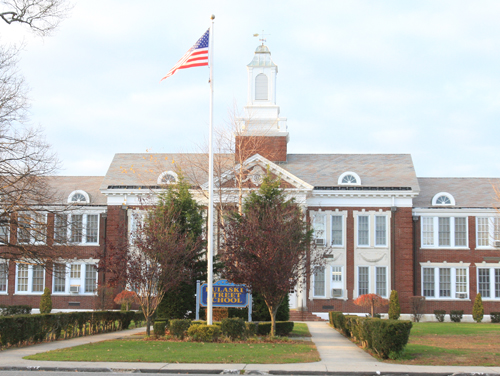State probe: Pulaski Street suspensions violated NYS regs
A New York State education department investigation into discipline at a Riverhead elementary school has found the school failed to follow proper procedure, staffed the in-school suspension room with a security guard instead of a teacher, and denied students with disabilities the protections they are afforded under state guidelines.
According to a report obtained by the Riverhead News-Review, the district was issued citations after three of four allegations leveled against Pulaski Street School and the district by an Aquebogue parent were proven to be true, according to the probe’s findings.
The state began looking into Pulaski Street’s disciplinary records for the 2011-12 school year after Yolanda Thompson filed a complaint that claimed the school broke state and federal laws by improperly suspending her son numerous times.
The state validated most of Ms. Thompson’s allegations.
Her son was removed from the classroom 13 times after he was diagnosed with attention deficit hyperactivity disorder by a doctor, according to the report.
Those suspensions, the state found, were in violation of state code.
The findings say the district “failed to acknowledge that the Student was a student presumed to have a disability, and failed to make immediate steps to complete an individual evaluation.”
The district also failed to notify the parent of the disciplinary actions taken against her son, and staffed the in-school suspension room with a security guard, not the certified teacher that the district’s code of conduct requires.
The state report also suggests there were other students with disabilities who were improperly suspended.
“None of the students with disabilities [who were suspended] were afforded the protections under [New York Code, Rules and Regulations] Part 201 as a result of the removals,” the report reads.
It was not immediately clear how many other students were affected. State education officials did not respond to requests for comment.
Riverhead schools superintendent Nancy Carney said she could not answer specific questions about the state’s findings until she spoke with school administrators, but added the district has taken steps already to address the problem.
“We immediately replaced the [in-school suspension] monitor with a certified teacher and reviewed proper procedure for parental notification with staff and administration,” she wrote in an email.
Ms. Carney said the district would share more information in the coming weeks, after she speaks with the Pulaski Street principal, David Densieski.
The state’s findings did, however, determine that one allegation made by Ms. Thompson — that the school never made a referral to special education for her son — was untrue. The report states a school psychologist did evaluate the student after his grades began to slip.
Ms. Thompson in February went before the Riverhead school board to urge them to take action on her claims of improper suspensions at the school. She then filed a notice of claim — the precursor to a lawsuit — against the district in June.
Though she initially declined to comment on the investigation results, Ms. Thompson later said after the News-Review published its report that she would file another state complaint against the district alleging the school didn’t properly notify her of her son’s suspensions.
Ms. Thompson has maintained her actions are not motivated by financial gain, or because she doesn’t want her son to be disciplined. She says she brought the matter to the public because she believed there was a systemic problem at the school.
Because the state cited the district, school administrators will have to revise their procedures and practices for disciplining students with disabilities to comply with state code.
The district will have to file “written procedures which describe the changes made” and evidence that changes have been made and “that staff had been trained on the change in procedures” by Oct. 1, according to the report’s findings.
Riverhead’s Special Education Parent Teacher Association co-president Arlene Gagliano said she was “very upset” when she first heard that improper suspensions of disabled students may have been a widespread problem.
“I’m glad this is all coming to light … [but] it’s sad that there had to be an investigation,” she said. “To have something like this happen is a terrible thing.”
Ms. Gagliano said she hopes to have SEPTA serve as a “go-between” for the district, affected parents and students, and the state.
She’s also planning a meeting this summer to explain the investigation’s findings to parents and describe what could be done to address any past or future potential violations.
But most importantly, she said, parents whose children were improperly suspended should know about what happened.
“We can’t fix the problem without acknowledging we have one,” Ms. Gagliano said. “Obviously we don’t want this to happen again. I hope it doesn’t and I don’t think it will.”









